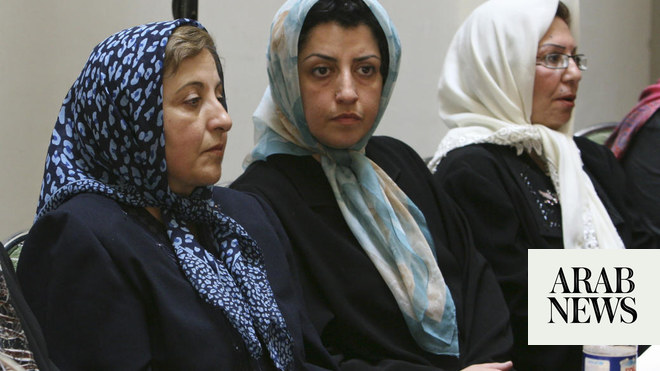
It was her unbearably sorrowful eyes that struck me most viscerally when I first met Nobel Peace Prize winner Nadia Murad. These eyes bore hauntingly eloquent testimony to the unbearable atrocities she had endured.
As Daesh attacked the Sinjar region of Iraq, Murad and hundreds of other Yazidi girls witnessed family members and neighbors slaughtered. These girls were enslaved, violently raped, tortured and traded from one fighter to another. Many were killed, many are still being held, and the fate of many will never be known.
Having faced brutal reprisals for an earlier attempt to escape, Murad risked her life by fleeing when her captor left the door unlocked. But she did not just survive. She courageously stood up and told the world about the brutality that women like her had faced, as beatings and gang rape became routine. When asked whether she had contemplated suicide, she responded that they had already died many times over, yet lived in constant fear that the future held far worse horrors.
Another thing that struck me about Murad is that she does not have an ounce of self-pity. She rarely talks or thinks about herself. I ask her how she is, and she immediately tells me about the wellbeing of those who escaped from captivity. Coming from a culture where speaking of sexual violence is an absolute taboo and victims face ostracization, Murad demanded that she be named and photographed to shatter the wall of silence and shame against innocent victims of rape.
In doing so, she facilitated the traumatic process of released women being welcomed back by communities that may once have shunned them. She consequently enjoys heroic status among the women of Sinjar. Murad and her legal team spearheaded the international campaign for Daesh personnel to be held to account for crimes against humanity. She visits refugee camps in Iraq, Greece and other locations, where Iraqis remain in harrowing conditions and vulnerable women continue to face the threat of sexual violence.
Dr. Denis Mukwege was awarded the Nobel Prize along with Murad for his work in treating thousands of women who had been violently raped during the Congolese conflict. He continued his work despite assassination attempts after publically criticizing the Congolese government’s failure to protect women.
We can no longer pretend to be unaware of this plague of sexual violence by powerful men against defenseless women worldwide.
Baria Alamuddin
The joint recognition of Murad and Mukwege was an ingenious way for the Nobel Prize Committee to highlight sexual violence against women worldwide. In conflict zones and supposedly civilized nations whose political elites should know better, this recognition does not come a moment too soon.
I was deeply touched by Murad’s harrowing autobiography, which she named “The Last Girl,” hoping that her campaign would ensure that she would be the “last girl in the world with a story like mine.” However, as the committee chairman observed, women in these conflicts are “used as a weapon of war.” Systematic rape has recently been documented against Rohingya women.
Even in Iraq, there are plentiful warning signs that such a scenario could repeat itself. The specters of terrorism, militancy and religious hatred have not been banished. Daesh is once again reconstituting itself in remote parts of central Iraq.
Meanwhile, Al-Hashd Al-Shaabi paramilitary forces — which themselves have been complicit in systematic war crimes such as sectarian cleansing and sexual attacks against displaced women — are today consolidating their position in government. The unleashing of sectarian forces was among the factors that tore Iraq apart in 2014 and allowed Daesh to embark on its genocidal campaign against the country’s minorities. Are the same mistakes being repeated?
I was overjoyed at this year’s choice of Nobel Prize, not least because this avoided the farcical scenario of the award going to US President Donald Trump and North Korean leader Kim Jong Un. Yet for Murad, this is a bittersweet moment: Nobody could envy the horrors she endured to achieve this pinnacle of global recognition. Responding to the award, she said: “I think of my mother, who was murdered by Daesh, the children with whom I grew up, and what we must do to honor them. Persecution of minorities must end.”
The most recent occasion I met Murad, there was a twinkle of happiness in those still-sad eyes. She was with her fiancé, and her human rights activism had given her a cause toward which she could focus her energies.
Murad’s and Mukwege’s awards must not just be a complacent slap on the back, but a reminder to us all of how women are disproportionately victimized in conflicts. It has been estimated that in the US, a women is raped every two minutes, and a child is raped every 15 minutes in India.
Yet such statistics are dwarfed by epidemic levels of sexual violence in the Congo, South Sudan and other warzones, creating a climate of constant terror for women, whose best hope when they hear soldiers attacking their village is to flee into the jungle to avoid being strung up to a tree, repeatedly violated, tortured and left to die.
All forms of sexual harassment and assault are acts of violence. While not all cases are equally extreme, they are all calculated to humiliate, violate and abuse imbalances of power. Along with the #MeToo movement and Christine Blasey Ford’s statements to the US Senate, Murad has become a voice for victims of sexual violence worldwide.
This recognition conferred by the Nobel Prize tosses the ball into our court. We can no longer pretend to be unaware of this plague of sexual violence by powerful men against defenseless women worldwide. But what will we do about it?
Baria Alamuddin is an award-winning journalist and broadcaster in the Middle East and the UK. She is editor of the Media Services Syndicate, and has interviewed numerous heads of state.
Disclaimer: Views expressed by writers in this section are their own and do not necessarily reflect Arab News" point-of-view












